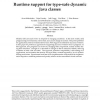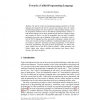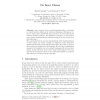111
click to vote
ECOOP
2000
Springer
15 years 6 months ago
2000
Springer
This paper studies specific language level abstractions for component-based programming. We propose a simple model which captures some basic ingredients — like explicit context ...
127
click to vote
ECOOP
2000
Springer
15 years 6 months ago
2000
Springer
Modern software must evolve in response to changing conditions. In the most widely used programming environments, code is static and cannot change at runtime. This poses problems ...
110
click to vote
ECOOP
2000
Springer
15 years 6 months ago
2000
Springer
The goal of research in programming languages should be to develop languages that integrates the best of concepts and constructs from the various programming paradigms. We do not a...
120
click to vote
ECOOP
2000
Springer
15 years 6 months ago
2000
Springer
Abstract. While sequential behavior of single objects is fairly well understood, orchestrating the collective behavior emerging from the behaviors of individual objects continues t...
ECOOP
2000
Springer
15 years 6 months ago
2000
Springer
Inner classes in object-oriented languages play a role similar to nested function definitions in functional languages, allowing an object to export other objects with direct acces...
107
click to vote
ECOOP
2000
Springer
15 years 6 months ago
2000
Springer
The support for precise exceptions in Java, combined with frequent checks for runtime exceptions, leads to severe limitations on the compiler’s ability to perform program optimiz...
106
click to vote
ECOOP
2000
Springer
15 years 6 months ago
2000
Springer
In object oriented programming, it is sometimes necessary to copy objects and to compare them for equality or inequality. We discuss some of the issues involved in copying and comp...
167
click to vote
ECOOP
2000
Springer
15 years 6 months ago
2000
Springer
We have recently shown how use cases can be systematically transformed into UML state charts considering all relevant information from a use case specification, including pre- and ...
103
click to vote
ECOOP
2000
Springer
15 years 6 months ago
2000
Springer
The paper presents the essential features of a new member of the UML language family that supports working with object-oriented frameworks. This UML extension, called UML-F, allows...
ECOOP
2000
Springer
15 years 6 months ago
2000
Springer
Classes play a dual role in mainstream statically-typed object-oriented languages, serving as both object generators and object types. In such languages, inheritance implies subtyp...



